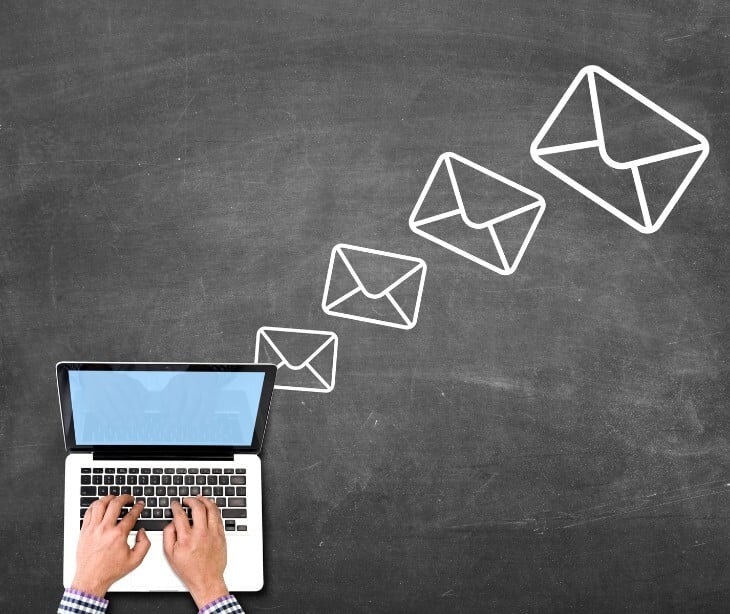
The cross-generational use of email in healthcare refers to email communication between healthcare providers and patients across different age groups.
How different age groups use email
According to market.us, “90% of Americans use email. With 95%, the highest email use by age group is between 25 and 44. For 15-24-year-olds, the penetration rate is lower than the 25-44 years old. Over 65 is the only age with a lower penetration rate.” These statistics highlight the widespread adoption and usage of email across different age groups.
However, different age groups use email differently, influenced by factors such as digital literacy, communication preferences, and technological habits. Here's a breakdown of how different age groups typically use email:
Younger generations (Generation Z and Millennials):
- Utilize email for both personal and professional communication.
- Prefer quick and concise emails over lengthy ones.
- Often use email as a means of receiving newsletters, updates from subscriptions, and promotions.
- May use email for job applications, networking, and maintaining professional relationships.
- Comfortable with managing multiple email accounts and integrating email with other digital tools and platforms.
Middle-aged adults (Generation X):
- View email as a primary mode of communication for both personal and professional matters.
- May use email for coordinating schedules, making appointments, and organizing events.
- Likely to have established email habits and preferences, such as folder organization and filtering rules.
- Use email for work-related correspondence, including communicating with colleagues, clients, and supervisors.
- Value email as a tool for managing tasks and staying informed about industry developments.
Baby boomers and older adults:
- Use email primarily for personal communication, such as keeping in touch with family and friends.
- May rely on email to receive updates from organizations, community groups, and government agencies.
- Some older adults may use email for managing finances, receiving electronic bills, and corresponding with service providers.
- Tend to prefer formal and detailed email communication, sometimes including salutations and signatures.
- May require assistance or training to navigate email interfaces and manage digital correspondence effectively.
Read more: The ubiquity of HIPAA compliant email in healthcare
Email use in healthcare
Factors influencing email usage in healthcare across age groups:
- Digital literacy: Comfort and proficiency with technology determine whether individuals of any age group will use email for healthcare communication.
- Access to technology: Availability of internet access and access to devices like computers, smartphones, or tablets can affect an individual's ability to use email for healthcare purposes.
- Healthcare provider practices: The extent healthcare providers encourage and facilitate email communication with patients can influence its usage across different age groups. Providers who actively promote email communication and provide support for patients to use it are likely to see higher adoption rates.
- Personal preferences: Individual preferences for communication methods also influence email usage. Some patients may prefer the convenience of email, while others may prefer more traditional forms of communication.
How different age groups use email in healthcare
- Younger generations (millennials and generation Z): Younger generations prefer email communication due to its convenience and flexibility, as they are tech-savvy and comfortable with digital communication tools. They may use email to schedule appointments, request prescription refills, ask questions about their health, or follow up on previous discussions with healthcare providers.
- Middle-aged adults (Generation X): Generation X, while comfortable with technology, may not be as digitally native as younger generations. They may use email for appointment scheduling, medication inquiries, and healthcare communication.
- Older adults (baby boomers and older): Older adults' familiarity and comfort with digital tools vary. Some use email for healthcare communication due to tech-savvyness, while others prefer traditional methods. The older adults group primarily uses email for tasks like appointment requests, test results, and health questions.
Tips for HIPAA compliance in email communication
The Health Insurance Portability and Accountability Act (HIPAA) sets forth strict standards for the privacy and security of protected health information (PHI). HIPAA compliant email ensures adherence to the strict privacy regulations set forth by HIPAA, thus safeguarding PHI transmitted using email.
Here is how healthcare providers can maintain HIPAA compliance in email communication:
- Use secure email platforms: Utilize secure email platforms or encrypted email services that comply with HIPAA regulations. These platforms offer encryption and other security measures to protect the confidentiality of patient information during transmission.
- Implement access controls: Limit access to patient information by implementing access controls such as passwords, multifactor authentication (MFA), and role-based permissions. Only authorized individuals should have access to patient-related emails.
- Avoid including PHI in subject lines: Refrain from including sensitive patient information, such as diagnosis or treatment details, in the subject lines of emails.
- Encrypt email attachments: If emailing documents or attachments containing PHI, encrypt them before transmission.
- Obtain patient consent: Obtain explicit consent from patients before communicating their PHI via email. Inform patients about the potential risks of electronic communication and ensure they understand the security measures in place to protect their information.
- Enable message expiry or recall: Some secure email platforms offer features such as message expiry or recall, allowing senders to set expiration dates for emails or retract messages sent in error.
- Use strong passwords and secure authentication: Ensure that email accounts used for healthcare communication have strong passwords and utilize secure authentication methods.
- Train staff on HIPAA policies: Provide comprehensive training to staff members on HIPAA regulations, email security best practices, and the proper handling of PHI. Ensure that employees understand their responsibilities regarding patient privacy and security when communicating via email.
- Monitor email usage: Regularly monitor email usage and conduct audits to identify any potential HIPAA compliance issues or breaches. Implement logging and auditing mechanisms to track access to patient-related emails and detect any unauthorized activities.
- Have policies for handling PHI: Develop and enforce policies and procedures for handling PHI via email, including guidelines for sending, receiving, and storing patient-related information. Regularly review and update these policies to reflect changes in technology and regulatory requirements.
Go deeper:
FAQs
How can patients ensure that their email communication with their healthcare provider remains confidential?
Patients should use secure email platforms provided by their healthcare provider and avoid using personal email accounts for sensitive medical inquiries. Additionally, patients should refrain from sharing personal health information in the subject line or body of the email to minimize the risk of unauthorized access.
Can I use email to communicate with my healthcare provider in an emergency?
Email may not be the most appropriate communication method for emergencies. Patients should call 911 or seek immediate medical attention if they require urgent assistance. Healthcare providers may have alternative methods for contacting them in urgent situations, such as a dedicated phone line or messaging system.
See also: How does HIPAA define an emergency?
How can businesses adapt their email communication to cater to different generations?
Businesses can adapt their email communication by considering the preferences and expectations of different generations. This may involve offering options for communication beyond email, such as messaging apps or live chat, and being mindful of the tone and style of emails sent to different age groups.
See also: Paubox Secure Message Center explained
Subscribe to Paubox Weekly
Every Friday we bring you the most important news from Paubox. Our aim is to make you smarter, faster.




